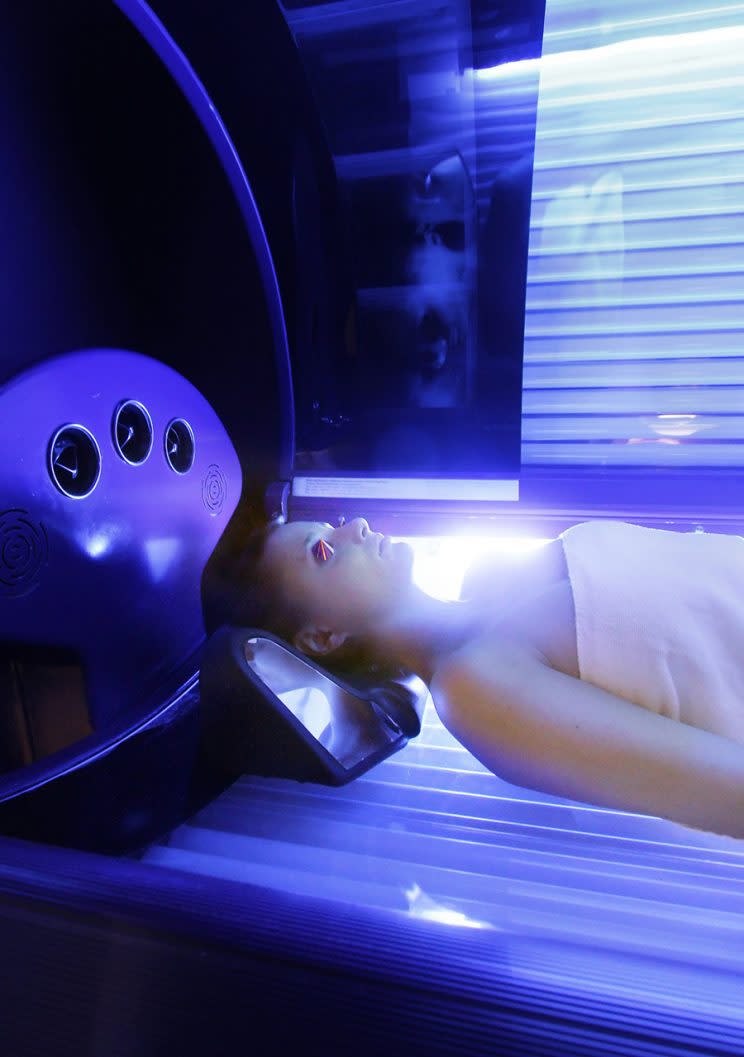Young Women Know About Skin Cancer Risks — But They’re Still Using Tanning Beds

Even though just about every young woman is aware that tanning can lead to skin cancer, as well as premature aging, most of them continue to close their eyes and bake away.
According to a study published in the Journal of Dermatological Science, investigators conducted a survey about the indoor tanning habits and overall attitudes about tanning of 629 white female undergraduate and graduate students between the ages of 18 and 30 at Indiana University’s campuses in Bloomington and Indianapolis. The participants who are either using tanning beds or who have done so in the past revealed the following:
4 percent agreed that tanning can cause skin problems, such as premature aging and skin cancer
7 percent disagreed that indoor tanning is safe, or at least safer than outdoor tanning
1 percent agreed they still like to get a tan, even though they know tanning may be bad for their skin
83.6 percent agreed that a tan makes them feel more attractive
83 percent agreed that compared to how they feel before tanning, they feel more relaxed and pleasant during tanning
The study experts also discovered that the women who are more likely to use indoor tanning machines have friends or family who do the same, and they tan easily, view tanning as attractive, and believe tanning can stimulate healthy vitamin D production.
“The high proportions of frequent tanners and people who admitted that they still like tanning despite knowing its harm among ever-tanners shed more light on the seriousness of this public health issue and the importance of tanning device control,” Keming Yang, a PhD student in epidemiology at Richard M. Fairbanks School of Public Health at Indiana University-Purdue University Indianapolis and the first study author, tells Yahoo Beauty.
She stresses the life-threatening dangers that can result from tanning. “Ultraviolet (UV) radiation from the sun is a well-known risk factor for premature skin aging and skin cancers,” states Yang. “Indoor tanning devices expose users to excessive UV radiation. Research [has shown] indoor tanning may be associated with elevated skin cancer risk, and may be particularly dangerous for younger and more frequent indoor tanners.”
Yang admits that she and her research colleague (Jiali Han, PhD, professor and chair of the Department of Epidemiology) were “a little surprised by how social-behavioral and psychological factors affect young women’s tanning behaviors, which also led us think further about the plausibility of addictive features in frequent tanning behavior.”
In fact, she adds that previous studies indicate that a chemical component could be responsible for the addiction.
“Basic research showed UV exposure may be associated with increased β-endorphin levels (a feel-good opioid) in vivo [a biological process that occurs within a living organism], suggesting frequent tanning may be driven by an opioid-dependent mechanism — one possible mechanism,” explains. Yang. “However, tanning addiction is not an official psychiatric disorder yet, and currently there is no standard for diagnosing tanning dependence.”
Let’s keep in touch! Follow Yahoo Beauty on Facebook, Twitter, Instagram, and Pinterest.
